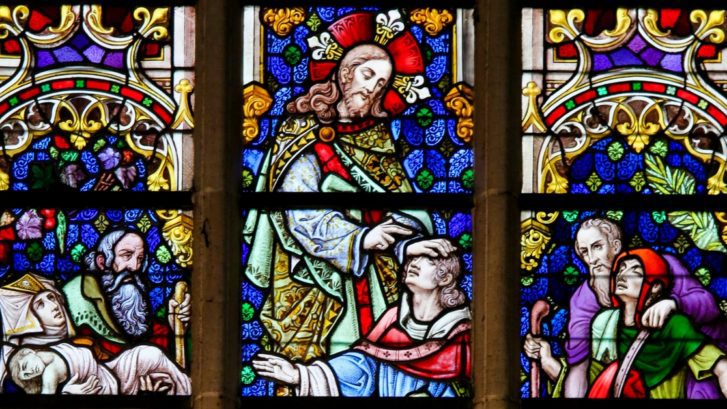Imagine a small tavern in the Polish countryside, run by a husband and wife, where life keeps the same pace, day in and day out. The couple is arguing, with the husband protesting about how much he loves his wife. The wife turns to her husband and says, “Tell me what hurts me.” The husband looks at his spouse, bleary-eyed, and replies, “How do I know what hurts you?” The wife’s reply is swift and to the point, “If you do not know what hurts me, how can you say you love me?”
Do you know what made Jesus so loving a person, the greatest lover in history? He knew what hurts us. He knew then, and He knows now. It shows up all through His life: with the sinful woman who touches him, to the scandal of His host, the Samaritan woman at the well, and to the amazement of His disciples. It shows up in all those passages that describe Jesus as having compassion.
This powerful verb is used over the sick who reach out to Jesus, a crowd that is hungry, a mother whose only son died, a king’s servant dreadfully in debt. A boy cruelly tormented by an evil spirit, two blind men sitting by the roadside, a leper begging to be made clean. To all of these, He reached out. He felt what they were feeling, not because He was an all-knowing God, but because He was all human. He was so exquisitely human that He was attuned to all that was human.
None of us goes through life without trials, without illness and upset. It seems to be part of our human condition. We have all suffered losses: loss of jobs, health, marriage, self-respect, youth, vigor, all these and more. Through this, the questions we might ask, is there healing, is there restoration? Is there a Jesus nearby to restore us?
In the gospel today we are told of Jesus healing the sick. We read that after sunset, as evening drew on, they brought Him all who were ill and those possessed by demons.
The sick could not be brought out into the glaring heat of the day, for it would make them worse, but as evening drew on, as the cooler wind from the sea was refreshing the village, they could be brought to Jesus.
As you read the story, we can almost see Jesus among the sick. It is the Gospel as its most beautiful, most comforting. It is a clear example of the love and power of Christ.
It is a fact that pain and suffering continue as part of everyone’s life. We know this, but we neither like nor understand it, especially when it happens to the innocent and the good. God’s power seems powerless, and we are left with the old enigma, “Why does He create a world in which we have to suffer and die?” The short answer is that God does not will evil. With the rebellions of the human race, evil came into the world. But perhaps, the only real answer to evil is trust: trust in the love and power of God, and trust in each other.
It is so easy to trust when we feel no need of trusting. How easy to believe in God, to proclaim His goodness, when we are untroubled when all our paths are serene. But let the storm come, let sickness come, let the loss of money or job come, let fear come, and then can we trust?
In St. Luke’s account of this event, we read, “All those who had friends suffering from diseases of one kind or another brought them to Him.” We see more than just the sick coming to Jesus, we see their friends urging them to come, encouraging them to come.
And this is how it should be, all helping each other to grow: if we are weak, we look for a friend, if we are strong, we offer our love and trust and help.
This is also one of the reasons that we come together as God’s people. Yes, it is true that we can talk to God alone, but all through history God has demanded that His people come together as a group to worship Him and to be aware of the needs of each other. This is part of the meaning of church, a group of people or believers helping all to believe, a group of trusters helping all to trust, a group of lovers helping all to love.
When it seems that your cross in life is too heavy to bear, and you may even be tempted to give up, you face abandonment of God.
God know what hurts us and love us unconditionally. Jesus wants to know you even better, He wants to meet your eyes, He wants to see your face. God can ease our hurt. When we give our pain to God, He will ease our burdens, so that, we too, can “Go in Peace.”


